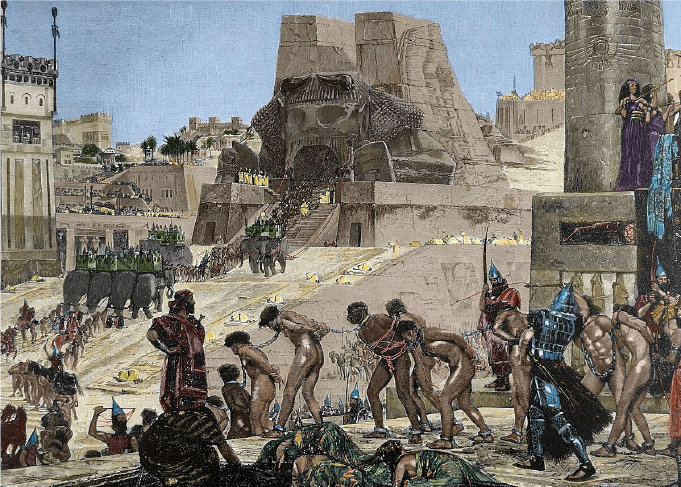This is a highly pertinent question that was asked during a catechesis group session. To answer it, we turn to the Catechism of the Church:
CCC 609. In sharing, within his human heart, the love of the Father for humankind, Jesus “loved them to the end” (Jn 13:1), “for there is no greater love than to lay down one’s life for one’s friends” (Jn 15:13). Thus, in suffering and death, his humanity became the free and perfect instrument of his divine love, which desires the salvation of humankind. Indeed, he freely accepted his passion and death out of love for the Father and for those whom the Father desires to save: “No one takes it from me, but I lay it down of my own accord” (Jn 10:18). Hence the sovereign freedom of the Son of God, when he himself goes to meet death.
Sacrifice and the Revelation of God: The Transformation of Matter and the Supreme Offering
The concept of sacrifice has been central to the history of human religions since the earliest times. However, what we understand by “sacrifice,” especially in the light of divine revelation, goes beyond the mere act of offering something on an altar or destroying a material substance. Sacrifice, in its deepest sense, involves a transformation: taking something from the realm of matter and turning it into something sacred, something that transcends its earthly existence and connects with the divine. This process—from material to spiritual transformation—reflects humankind’s quest for a way to reconcile with the sacred, a desire evident in religious traditions from the dawn of history.

Human Sacrifice in the Pre-Christian Context
Before God fully revealed Himself to the world, humanity—immersed in its search for divinities—sought ways to appease the gods through sacrificial offerings. These practices were deeply rooted in a mythical and ritualistic understanding, in which sacrifice was seen as a means of restoring a relationship with divine beings, often in exchange for favour or protection. In general, sacrifice involved the offering of something valuable or precious—a gesture of devotion intended to establish a bond between human beings and cosmic or divine forces.
One of the most extreme forms of sacrifice found in ancient religions was human sacrifice. It was believed that human life, as the most precious of all offerings, could appease the wrath of the gods and ensure prosperity and protection for the community. This type of sacrifice was common in various cultures, including ancient Mesopotamia, the Mayan Empire, and civilisations of the Middle East, such as the Canaanites. At that time, it was thought that human blood held a special power to attract the attention of the gods and restore cosmic harmony—or, at the very least, to secure a favourable state for humanity.
Although radical, human sacrifice reflects a search for redemption and an attempt to deal with the forces believed to govern the universe. However, as human beings strove to approach the transcendent through such acts, the truth about the real meaning of sacrifice remained hidden—particularly its potential to truly transform the relationship between man and God.
Divine Revelation and the End of Human Sacrifice
It was only through the divine revelation in Jesus Christ that the practice of sacrifice was given a new and decisive meaning. When God revealed Himself to the world, He did not do so in an abstract or distant manner, but through the incarnation of His Son, Jesus Christ, who—in His life, death, and resurrection—brought a new perspective on what sacrifice truly is. Unlike pagan sacrifices, which involved the offering of something external, material, and often destructive, Christ’s sacrifice is essentially different and profoundly redemptive.
CCC 613: “The sacrifices of the Old Covenant were abolished because Christ, by offering Himself once for all as a holocaust, fulfilled the entire meaning of sacrifice.” God, by revealing Himself through Christ, brought an end to the need for any further sacrifices, for nothing else could be offered that would definitively atone for sin.
The Catechism of the Catholic Church explains that the sacrifices of the Old Testament were intended to prepare the people for the definitive sacrifice of Christ. According to Christian tradition, human sacrifices—even those made with intentions of worship or appeasement of the gods—were profoundly misguided, as they could not truly redeem humanity. The Catechism (CCC 605) stresses that human sin could only be atoned for by a perfect and divine sacrifice. Therefore, Christ’s death on the Cross, as a voluntary and redemptive offering, is the ultimate answer to the question of salvation.
The Offering of Self: The Sacrifice of Christ
Jesus, the Son of God, freely offered Himself as the perfect and final sacrifice, fully satisfying divine justice. He not only shed His blood, but gave His very life in obedience to the Father. The Catechism highlights: “No one takes My life from Me; I lay it down of My own accord” (John 10:18), revealing the sovereign freedom with which Christ chose to make this sacrifice.
Christ’s sacrifice on the Cross was the greatest and most complete offering ever made, as it involved the self-giving of the very life of the Son of God. This not only revealed the depth of God’s love for us, but also unveiled the true nature of sacrifice: it is not the material value of the offering that defines it, but the intention, the self-gift, and the love for the one to whom it is directed.
The Catechism further affirms that Christ’s sacrifice on the Cross is the “perfect sacrifice” because it was not imposed, but freely and willingly chosen in obedience to the Father, and at the same time a manifestation of God’s immeasurable love for humanity (CCC 613). The sacrifice of Jesus is unique—not only because of His divine nature, but also because He did not merely offer something material, but His very self, for the purpose of restoring the relationship between God and humanity.
In other words, the sacrifice of Christ transforms the offering of the material (human life, blood) into an act of purification and salvation. The value of this sacrifice does not lie in physical suffering itself, but in the obedience and love with which it was carried out—something that previous material offerings and human sacrifices could never achieve.
The Transformation of Sacrifice
The Christian sacrifice is, therefore, an offering of transformation. Rather than an act of destruction, it is an act of purification and regeneration. The Catechism explains that Christ’s sacrifice holds universal and timeless value—surpassing the historical moment in which it took place—and has the power to redeem all humanity (CCC 616).
This sacrifice has the power to turn sin into forgiveness, death into life, and man’s slavery to sin into freedom. At the moment when Christ offers His life on the Cross, He transforms matter, suffering, and death—uniting all these aspects of human reality to the divine purpose of salvation. The death of Christ is not an end, but the beginning of a new creation, in which sacrifice becomes a symbol of love, redemption, and eternal life.
The Legacy of Christ’s Sacrifice in Christian Life
CCC 1368: “The Eucharist is the memorial of Christ’s sacrifice, through which the faithful are united with Him and become a living offering.” Reflecting on Christ’s sacrifice, we come to understand that the true nature of sacrifice lies not in destruction, but in the transformation of the human heart. Although Christ’s sacrifice was unique and unrepeatable, He calls every Christian to live in His likeness—offering themselves as a living sacrifice of love to God and neighbour.
The Christian sacrifice is, therefore, also an invitation to ongoing transformation. By uniting ourselves to the Eucharist, we participate in the sacrifice of Christ not merely as a memory of the past but as a lived experience in the present. It leads us to transform our own lives and our daily actions into offerings of love to God and to others. Sacrifice thus becomes a means of drawing closer to God—not through external and material offerings, but through the gift of our hearts and our lives.
Human sacrifice, practised throughout history by various cultures, was a way of seeking something beyond human reach: true reconciliation with the divine. However, neither human sacrifices nor material offerings were capable of achieving that goal. Only the sacrifice of Christ—His self-giving in love and obedience to the Father—was able to transform the reality of sin and death into a reality of salvation and eternal life.
In fully revealing Himself through Christ, God not only brought an end to the need for any material sacrifice, but opened the path for the true transformation of the human person—calling all to take part in the perfect and redemptive sacrifice of His Son. Christ’s offering is the ultimate offering, for it is He who, through His death and resurrection, reconciles humanity with the Father. The sacrifice of Christ is the definitive answer to the human longing for redemption, and at the same time, the supreme expression of divine love for all of us.
The Difference Between Sacrifice and Self-Denial
While sacrifice involves transformation and consecration, self-denial often amounts to a simple renunciation. A person may give something up for personal or social reasons, without intending to make the act spiritually meaningful. For instance, refraining from a momentary pleasure for the sake of health or discipline is a form of self-denial—but not necessarily a sacrifice in the higher, spiritual sense.
However, when such renunciation is offered as a way of giving something greater to God or to one’s neighbour, it becomes sacrifice. This distinction is crucial so that we do not mistake personal efforts for genuine acts of consecration. Sacrifice requires a transcendent dimension—something that goes beyond self-interest and connects with the divine or the common good.
The Sacrifice of Jesus Christ: The Supreme Model
The Passion and death of Jesus Christ are the fullest expression of true sacrifice. He did not merely renounce His life—He freely offered it for the redemption of humanity. As He Himself declared: “No one takes My life from Me. I lay it down of My own accord” (John 10:18). This act reveals the essence of sacrifice: a free, loving gesture directed toward a higher good.
On the Cross, Jesus transformed suffering into redemption, death into life, and weakness into strength. He invites us to follow His example by surrendering our lives to God’s will and living with a greater purpose. His sacrifice was not just a historical event; it is an eternal reality that continues to transform and inspire us.


Living Sacrifice in Daily Life
True sacrifice does not require grand or spectacular acts. It can be found in small gestures of love, dedication, and self-giving. When we offer our work, our struggles, and even our joys to God, we are practising sacrifice. We transform the ordinary into something sacred and allow our lives to become instruments of His grace.
Sacrifice also teaches us to love more deeply. It calls us to step outside of ourselves, to look towards others, and to live with generosity. By imitating the example of Jesus, we learn that true love is the love that gives of itself—even when it involves suffering or renunciation. This sacrificial love is the key to a full and meaningful life.
Understanding the true meaning of sacrifice is essential for living a life of purpose and connection with God. It challenges us to go beyond mere self-denial and to transform our actions into something sacred, offering everything we do as an act of love and consecration. Inspired by the example of Jesus Christ, we can find in sacrifice not merely a renunciation, but an opportunity to draw closer to the divine and to live with deeper intention and meaning.
